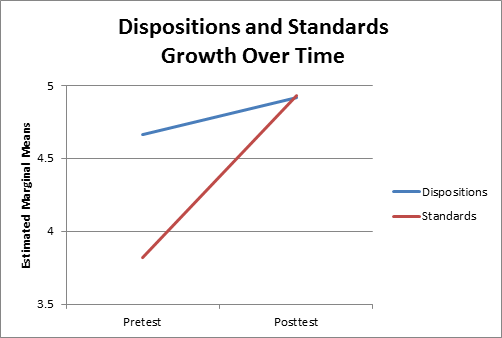| << Chapter < Page | Chapter >> Page > |

In summary, the results showed that there was a significant growth in self-perceptions from the pretest to posttest results of the EDAD candidates’ of their development of the knowledge, skills and dispositions different at the end of the leadership compared to their ability to apply the knowledge, skill and disposition when they first entered the program. Secondly, the change of self-perceptions of knowledge and skills grew from a lower pretest score to a nearly equal posttest score different from the change of dispositions. The difference of growth is most likely attributable to dispositions being part of a foundation that students developed with guidance of their parents while they were growing into adulthood. The significant emphasis on social justice in our program could attribute to the growth. We believe that we must teach our candidates to take active roles to intervene on oppressive power differences and work to create schools that develop everyone’s capacity to think, to critique, and to carryout civil discourse about complex, debatable issues (Surface, et al. 2011). Furthermore, our future leaders leave our program with the understanding that it is, indeed, their obligation to create new possibilities for children, their families and work with the community in order to build the capacity to improve community life overall.
Bolman, L. G.,&Deal, T. L. (2008). Reframing Organizations: Artistry, choice and leadership (4th ed.). San Francisco: Jossey-Bass.
Council of Chief State School Officers. (2008). Educational Leadership Policy Standards (Monograph). Retrieved from Council of Chief State School Officers website: http://www.ccsso.org/Documents/2008/Educational_Leadership_Policy_Standards_2008.pdf
Davis, S. H. (1998, March/April). Why do principals get fired? Principal, 78 (2), 34-39.
Edick, N., Danielson, L.,&Edwards, S. K. (2006, Fall). Dispositions: Defining, aligning, and assessing. Academic Leadership, 4 (4).
Edwards, S. K.,&Edick, N. (2006, Spring). Dispositions matter: Findings for at-risk teacher candidates. The Teacher Educator, 42 (1), 1-13.
Foster, W. (1986). Paradigms and promises: New approaches to educational administration . Buffalo, NY : Prometheus Books .
Gilligan, C. (1982). In a different voice - Psychological theory and women’s development . Cambridge, MA: Harvard University Press.
Hallinger, P.,&Heck, R. H. (1996). Reassessing the principal’s role in school effectiveness: A review of empirical research 1980-1995. Educational Administration Quarterly, 32 (1), 5-44.
Heifetz, R. A. (2006). Educational Leadership: Beyond a focus on instruction. Phi Delta Kappan, 87 (7), 512-513.
Keiser, K. A. (2009). Educational administration candidates’ diversity dispositions: The effect of cultural proficiency and service learning. Educational leadership and administration: Teaching and program development, 21 (1).
National Council for the Accreditation of Teacher Education. (2002). Professional standards for the accreditation of schools, colleges and departments of education (NCATE, Ed.).
Noddings, N. (1984). Caring: A feminine approach to ethics and moral education . Berkeley: University of California Press.
Poliner-Shapiro, J.,&Gross, S. J. (2007). Ethical Educational leadership in turbulent times: Resolving moral dilemmas. New York: Routledge.
Schulte, L. E.,&Kowal, P. (n.d.). The validation of the Administrator Dispositions Index. Educational leadership and administration: Teaching and program development, 17 , 75-87.
Shapiro, J. P., Gross, S. J.,&Shapiro, S. H. (2008, May). Ethical decisions in turbulent times. School Administrator, 65 (5), 18-21.
Shapiro, J. P.,&Stefkovich, J. A. (2005). Ethical leadership and decision making in education: applying theoretical perspectives to complex dilemmas . Mahwah, New Jersey: Lawrence Erlbaum Associates.
Starratt, R. J. (1994). Building an ethical school . London: Falmer Press.
Strike, K. A. (2007). Ethical Leadership in schools . Thousand Oaks, CA: Corwin Press .
Surface, J. L., Smith, P. J., Keiser, K. A.,&Hayes, K. (2011). Leadership for social justice: A matter of policy development. In Encouraging the intellectual and professional capacity of others: A social justice agenda (pp. 79-96). Charlotte, NC: Information Age Publishing.

Notification Switch
Would you like to follow the 'Education leadership review special issue: portland conference, volume 12, number 3 (october 2011)' conversation and receive update notifications?